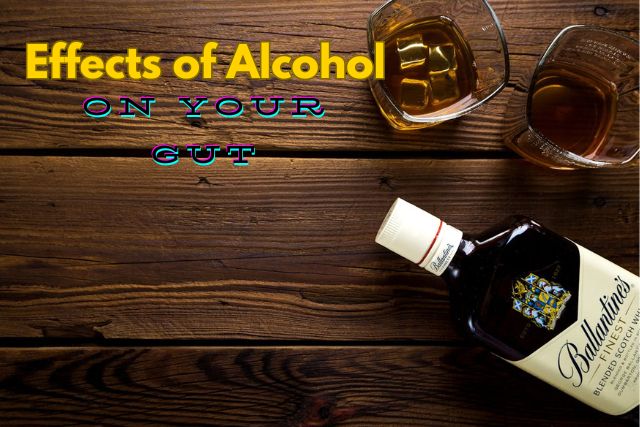
Effects of Alcohol
Alcohol is a popular beverage consumed in various social and cultural settings, but its impact on health is often overlooked. While moderate consumption might have some cardiovascular benefits, excessive alcohol intake can significantly harm various parts of the body, including the gut.
The gut, often referred to as the “second brain,” plays a critical role in overall health, affecting digestion, immunity, and even mood. Let’s explore effects of alcohol consumption on gut health, the mechanisms involved, and some practical ways to treat your gut if you’ve been drinking.
How Alcohol Affects the Gut
Alcohol can disrupt gut health in several ways, from altering the balance of gut bacteria to damaging the gut lining. Here are some of the primary ways alcohol affects the gut:
Imbalance in Gut Microbiota
The gut microbiota, a diverse community of trillions of bacteria, fungi, and other microorganisms, is essential for maintaining gut health. Alcohol consumption, especially in excess, can disrupt this balance. This condition, known as dysbiosis, can lead to various health issues. Research has shown that excessive alcohol intake reduces beneficial bacteria like Lactobacillus and Bifidobacterium while promoting the growth of harmful bacteria such as Proteobacteria. This imbalance may contribute to a weakened immune system, inflammation, and an increased risk of diseases such as inflammatory bowel disease (IBD) and irritable bowel syndrome (IBS).
Increased Gut Permeability
Excessive alcohol consumption can damage the intestinal lining, leading to a condition commonly referred to as “leaky gut.” In a healthy gut, tight junctions between the cells lining the intestines help keep harmful substances out of the bloodstream.
However, alcohol can weaken these tight junctions, allowing toxins, bacteria, and undigested food particles to leak into the bloodstream. This increase in gut permeability triggers an immune response and inflammation, which can cause symptoms such as bloating, abdominal pain, and fatigue.
Over time, this inflammation may contribute to the development of chronic diseases.
Impact on Digestion and Nutrient Absorption
Alcohol interferes with the digestive process by reducing the production of digestive enzymes and impairing the absorption of nutrients like vitamins B12, folic acid, and thiamine. This malabsorption can lead to nutrient deficiencies, which may cause symptoms like fatigue, anemia, and nerve damage. Moreover, alcohol’s diuretic effect can contribute to dehydration, further complicating digestion and nutrient absorption.
Long-term Consequences of Alcohol on Gut Health
Increased Risk of Gastrointestinal Disorders
Chronic alcohol consumption is linked to several gastrointestinal disorders, including gastritis, pancreatitis, and liver disease. Alcohol can inflame the stomach lining, leading to gastritis and peptic ulcers, which can cause pain, nausea, and bleeding.
Furthermore, alcohol abuse is a major risk factor for liver disease, as the liver plays a crucial role in metabolizing alcohol. Damage to the liver, such as fatty liver disease, hepatitis, and cirrhosis, can further compromise gut health.
Altered Gut-Brain Axis
The gut-brain axis is a communication network that links the gut and brain. Alcohol can disrupt this connection by affecting neurotransmitters and gut hormones, leading to mood disorders like depression and anxiety.
Dysbiosis and inflammation caused by alcohol can further impact mental health by altering serotonin production, which is mainly produced in the gut. This disruption may contribute to the “hangxiety” (hangover anxiety) that some people experience after heavy drinking.
How to Treat Your Gut After Alcohol Consumption
If you’ve consumed alcohol and want to support your gut health, there are several strategies to help your body recover and restore balance:
Rehydrate Thoroughly
Alcohol has a dehydrating effect on the body, which can harm the gut and other systems. Rehydrate with plenty of water and consider electrolyte-rich fluids like coconut water or oral rehydration solutions to replenish lost minerals.
Consume Probiotics and Prebiotics
Reintroducing beneficial bacteria to the gut can help restore balance after alcohol-induced dysbiosis. Probiotic-rich foods like yogurt, kefir, sauerkraut, and kimchi can help replenish healthy gut bacteria.
Pair these with prebiotic foods like bananas, garlic, and onions to nourish the probiotics and promote a thriving gut microbiome.
Eat a Fiber-Rich Diet
Fiber supports digestion and feeds beneficial bacteria in the gut. Whole grains, fruits, vegetables, and legumes are excellent fiber sources. A fiber-rich diet can aid in repairing the gut lining and maintaining a healthy microbiome.
Prioritize Anti-Inflammatory Foods
Alcohol can trigger inflammation, so including anti-inflammatory foods in your diet can help soothe the gut. Foods rich in omega-3 fatty acids (like salmon, chia seeds, and flaxseeds), antioxidants (like berries, green tea, and turmeric), and polyphenols (like dark chocolate and red grapes) can help reduce inflammation and promote healing.
Avoid Further Irritants
After consuming alcohol, it’s wise to avoid additional irritants, such as spicy, fatty, or highly processed foods. These can exacerbate gut issues and make it harder for your gut to recover. Opt for gentle, easy-to-digest meals like soups, steamed vegetables, and lean proteins to give your gut a break.
Consider Supplementing with Glutamine
Glutamine is an amino acid that helps repair the gut lining. While it’s naturally found in foods like chicken, fish, and spinach, it’s also available as a supplement. Glutamine may help reduce gut permeability and support recovery after alcohol consumption.
Read more about: Anti-Aging Tips for Youthful Skin
In Summary
The impact of alcohol on gut health is substantial and multifaceted. While occasional drinking in moderation may not cause long-term harm, regular and excessive consumption can lead to dysbiosis, increased gut permeability, and a host of digestive and systemic issues.
If you’ve been drinking, taking steps to support and treat your gut—such as rehydrating, consuming probiotics, and eating a fiber-rich diet—can aid in recovery and promote overall well-being. Your gut health is central to your overall health, so it’s worth making informed choices to keep it in balance.





